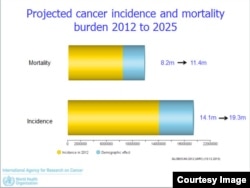WASHINGTON —
The number of cancer cases worldwide is expected to surge by 57 percent during the next two decades. A new World Health Organization report is predicting what the agency calls a "human disaster," and notes the cost of increasing cancer rates will disproportionately affect developing countries.
The WHO World Cancer Report said global cancer cases will rise from an estimated 14 million this year to 22 million annually within the next 20 years. The annual cancer deaths are also expected to increase from 8.2 million to 13 million a year.
According Dr. Bernard Stewart, who co-edited the report, developing countries are to bear most of the increase. More than 60 percent of the cases occur in Africa, Asia and Central and South America, and these account for about 70 percent of the world’s cancer death.
“For much low and middle-income countries, there is an additional burden of cancers which are related it to infection. Cervical cancer in women is due to infection by human papillomavirus and liver cancer is due to infections by hepatitis,” stated Stewart.
Source: WHO / IARC
The rising incidents of cancer in the developing countries, he added, are also linked to industrialized lifestyle and the lack of early detection.
“The low and middle-income countries often have poor clinical services. So cancers are not diagnosed till they're at a late stage. So the survival of cancer patients is much worse in these countries,” Stewart said.
The report warns that the global battle against cancer won’t be won with treatment alone and urgently needs effective prevention measures to curb the disease. Targeted vaccination campaigns, Dr. Stewart says, can markedly reduce infection related cancers. Preventing the spread of tobacco and alcohol use, raising awareness about obesity and sugar consumption can also be crucial in cancer control.
The World Cancer report, released Tuesday on the eve of World Cancer Day, is a collaboration of more than 250 scientists from more than 40 countries.
The WHO World Cancer Report said global cancer cases will rise from an estimated 14 million this year to 22 million annually within the next 20 years. The annual cancer deaths are also expected to increase from 8.2 million to 13 million a year.
According Dr. Bernard Stewart, who co-edited the report, developing countries are to bear most of the increase. More than 60 percent of the cases occur in Africa, Asia and Central and South America, and these account for about 70 percent of the world’s cancer death.
“For much low and middle-income countries, there is an additional burden of cancers which are related it to infection. Cervical cancer in women is due to infection by human papillomavirus and liver cancer is due to infections by hepatitis,” stated Stewart.
Major Cancer Risks
Major Cancer Risks- Tobacco use
- Infections
- Alcohol use
- Inactivity and obesity
- Radiation from the sun and medical tests
- Air pollution, naturally occurring carcinogens
- Reproductive factors, including having children later
Source: WHO / IARC
“The low and middle-income countries often have poor clinical services. So cancers are not diagnosed till they're at a late stage. So the survival of cancer patients is much worse in these countries,” Stewart said.
The report warns that the global battle against cancer won’t be won with treatment alone and urgently needs effective prevention measures to curb the disease. Targeted vaccination campaigns, Dr. Stewart says, can markedly reduce infection related cancers. Preventing the spread of tobacco and alcohol use, raising awareness about obesity and sugar consumption can also be crucial in cancer control.
The World Cancer report, released Tuesday on the eve of World Cancer Day, is a collaboration of more than 250 scientists from more than 40 countries.












